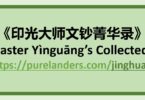
修德显性德,人定可胜天
[225] [With] Cultivated Virtues Revealing Nature’s Virtues, Humans Definitely Can Conquer Destiny
《华严经》云:「一切众生,皆具如来智慧德相,但因妄想执著,不能证得。」
[The] Flower Adornment [i.e. Avataṃsaka] Sūtra says, ‘All sentient beings, [are] all complete [with] Thus Come [Ones’] wisdom [and] virtues’ forms, only because [of] false thoughts [and] attachment, not able [to] realise [and] attain [them].’
[Note 1: In other words, ‘sentient beings all have Buddha-nature’ (众生皆有佛性), the nature of the Buddhas, the potential to realise Buddhahood (佛果).]
是知智慧德相,乃生佛所同,即性德也。有妄想执著,离妄想执著,则生佛迥异,即修德也。
[It should be] known [that] this wisdom [and] virtues’ forms, [are] thus [with] those [of] sentient beings [and] Buddhas [the] same, then [due to] nature’s virtues. [One] has false thoughts [and] attachment, [while the other has] departed [from] false thoughts [and] attachment, thus [with] sentient beings [and] Buddhas totally different, then [due to] cultivated virtues.
[Note 2: Nature’s virtues (性德) are those inherent in Buddha-nature, while cultivated virtues (修德) are those expressed.]
修德有顺有逆。顺性而修,愈修愈近,修极而彻证,证而了无所得。逆性而修,愈修愈远,修极而永堕恶道,堕而了无所失。
Cultivated virtues [are] with [those] according [and] with [those] opposing [nature. Of those] according [with] nature then cultivating, the more cultivating [there is], the more close [it will be]. Cultivating [to the] utmost then [with] complete realisation, [with] realisation yet completely without that attained. [Of those] opposing nature then ‘cultivating’, the more ‘cultivating’ [there is], the more far [it will be]. ‘Cultivating’ [to the] utmost then [with] long falling [into] evil paths, [with] falling yet completely without that lost.
[Note 3: That of ‘without that attained’ and ‘without that lost’ is Buddha-nature and its virtues, as they are inherently there, with or without cultivation. However, it is only with cultivation of virtues that Buddha-nature can be realised.]
了此,则愚者可贤,贤者可愚,寿者可夭,夭者可寿。富贵贫贱,及与子孙之蕃衍灭绝,一一皆可自作主宰。
Understanding this, then can those foolish [become] virtuous, can those virtuous [become] foolish, can those [with] long lives [have] premature deaths, [and] can those [supposed to have] premature deaths [have] long lives. [Of] wealth [and] honour, poverty [and] lowliness, and with [the] multiplication [and] extinction of children [and] grandchildren, [of] each [and] every [one], all can personally act [as their] masters.
[Note 4: Those who become more virtuous by cultivating virtues (修德) to realise their nature’s virtues (性德) will have longer lives, more wealth with honour and descendants (if wished). Those who become more foolish by ‘cultivating’ the non-virtuous to part from their nature’s virtues will have shorter lives, more poverty with lowliness and less descendants (if wished).]
则有凭据者亦可无凭据,无凭据者亦可有凭据。如山之高不可登,人不能由,不妨凿岩设砌,则绝顶亦可直到矣。
Then having those [with] foundation, [who] also can [become those] without foundation, [and] those without foundation. [who] also can [become those] with foundation. Like [a] mountain high that cannot [be] ascended, [with] people not able [to] follow [along, they] might as well chisel rocks [to] establish stone steps. Then [if with a] distant peak, [it] also can [be] directly reached.
[Note 5: If ‘cultivating’ in the wrong direction, even those with a spiritual foundation will be as if without it. If cultivating in the right direction diligently, even with great obstacles, they can all be overcome.]
古今人,不知随心造业、随心转业之义,多少大聪明大学问人,弄得前功尽弃,尚且遗害累劫。
[Due to] ancient [and] modern people, not knowing [the] meanings of according [to the] mind creating karma, [and] according [to the] mind transforming karma, how many people [with] great ‘intelligence’ [and] great ‘knowledge’, manage to [have their] previous efforts all lost, in addition, leaving harm [for] accumulated kalpas?
[Note 6: From the mind, is karma created, mentally, verbally and physically. Thus, it is with the mind that karma can be changed too, with the creating of different karma. If the law of karma is not understood, the ‘intelligent’ are actually foolish, and the ‘knowledgeable’ are actually ignorant, who might let their misconceptions harm themselves for many lives. If they taught them to others, they can harm them for many lives too.]
若不修德,即亲身做到富有天下、贵为天子,与夫位极人臣、声势赫弈之宰辅地位,有不即世而身戮门灭者哉?是亲得者皆无凭也。
If not cultivating virtues, even [if] personally accomplishing wealth [of the] heavens below, honoured as heaven’s son [i.e. emperor], and [as] those [with] positions utmost [as] people’s officials, [with the] prime minister’s position’s prestige [and] power, are [there] not those [in this] immediate life, then [with] themselves killed [and with their] clans destroyed? [This] is [with] those personally attaining [them] all [being] without foundation.
[Note 7: Even if not cultivating virtues, it is still possible to be accomplished in worldly ways due to much past good karma (善业) bearing fruit naturally. If there is no continual cultivating of virtues, with past good karma running out, and/or while ‘cultivating’ the non-virtuous instead, the evil karma (恶业) created can in the worst-case scenario kill oneself, and loved ones, if they have corresponding collective (evil) karma (共业) too.]
袁了凡颇会此义,故一切所享者皆非前因所定也。前因,俗所谓天。天定者胜人,谓前因之难转也。人定者亦可胜天,谓兢业修持,则前因不足恃。是以现因为因,而消灭前因也。若恣意妄为,则反是。
[As] Yuán Liǎofán [had] considerable understanding [of] these meanings, thus [knowing] all that enjoyed [are] not all [from] past causes, [as] those fixed. Past causes [form that] commonly so-called destiny. That [on] ‘destiny definitely conquers humans’, [is so-]called [with] past causes [as] those difficult [to] transform. That [on] ‘humans definitely [can] also conquer destiny’, [is so-]called [with] careful [and] conscientious practice, then [with] past causes not enough [for] relying [on. This] is with [a] present cause as [the] cause, then eliminating [a] previous cause. If [with] unrestrained thoughts [and] reckless actions, then is [it the] reverse.
[Note 8: Yuán Liǎofán’s (袁了凡) understanding on the law of karma (i.e. cause and effect [因果]) are recorded in his Liǎofán’s Four Lessons《了凡四训》: http://www.donglin.org/wenku/9/F-003%20%E4%BA%86%E5%87%A1%E5%9B%9B%E8%AE%AD-%E6%9C%AC%E4%B9%89%E7%9B%B4%E8%A7%A3%EF%BC%88%E7%BD%91%EF%BC%89%202021.1.9.pdf. ‘With past causes not enough for relying on’ means they become that not fully reliable as the present causes created can transform, by mitigating or magnifying their effects, for better or worse accordingly.]
了此,则欲愚者贤,庸平者超拔,皆在自己之存心修德,随时善教而已。
Understanding this, then [will] those about [to be] foolish [become] virtuous, those ordinary [and] common [become] outstanding, all [depending] on one’s [own] attentive cultivating of virtues, [at] all times [practising] good teachings only.
净土宗十三祖印光大师
Pure Land Tradition’s 13th Patriarch Great Master Yìnguāng
《印光法师文钞》(正编):复永嘉某居士书六;
Dharma Master Yìnguāng’s Collected Writings (First Compilation): Sixth Reply Letter [To A] Certain Yǒngjiā Layperson;
印光大师文钞菁华录(第两百二十五则):五、勉居心诚敬(第三则)
Record [Of] Great Master Yìnguāng’s Collected Writings’ Essence (225th Short Section): 5th [Chapter]: Encouragement [Of The] Mind [To] Dwell [In] Sincerity [And] Reverence (3rd Short Section)
[Ref: #225 / 5.3]
Namo Amituofo : Translation and notes by Shen Shi’an
下一部分
Next Part:
报通三世、转变由心
[226] Rewards And Retribution Connected Through The Three Periods, Are With Transformations Due To The Mind
https://purelanders.com/2022/09/17/226-rewards-and-retribution-connected-through-the-three-periods-are-with-transformations-due-to-the-mind
上一部分
Previous Part:
诚明之道,因果相辅
[224] Help One Another On The Path Of Sincerity And Brightness, With Teachings On Cause And Effect
https://purelanders.com/2022/09/13/224-help-one-another-on-the-path-of-sincerity-and-brightness-with-teachings-on-cause-and-effect
完整典籍
Complete Text:
《印光大师文钞菁华录》
Record Of Great Master Yìnguāng’s Collected Writings’ Essence
https://purelanders.com/jinghualu






